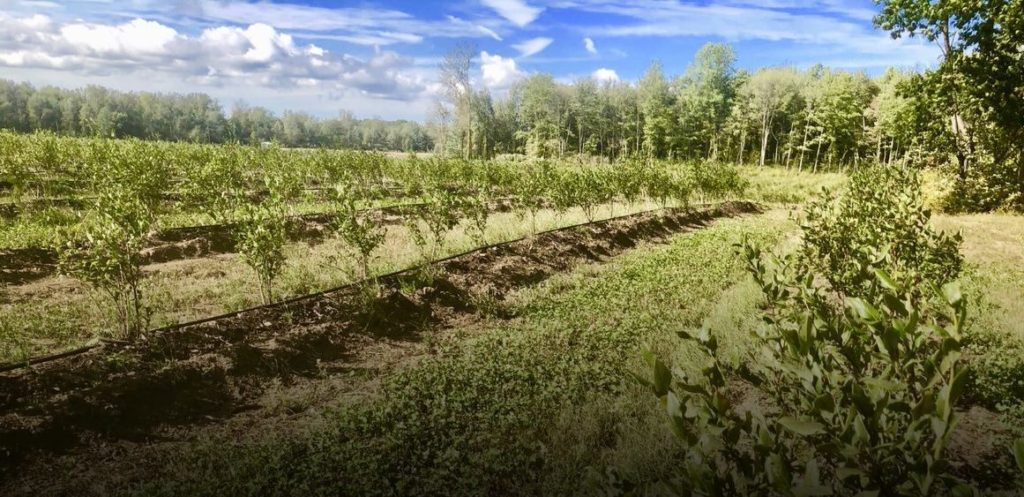Michigan Industries and the Reality of Climate Change
October 2, 2019
Better Way Farms in South Haven, Michigan has had to take costly measures to protect their crops due to hotter, drier summers.
As an organic blueberry farmer, Joseph Jessup has faced it all the last few seasons: a late spring frost, extreme temperature swings, failed bee pollination, and crop loss.
“In the past, you could count on temperatures being consistent and warm through the end of September. But that’s not the case anymore,” says Jessup, who sells his organic blueberries — grown in Better Way Farms in South Haven, Michigan — to Busch’s and Plum Market. Now there are more weather extremes, he says, like colder temperatures in the winter and hotter, drier summers.
A 2018 climate change analysis by CDP found that some of the world’s biggest companies, from technology firms to large banks, are preparing for direct impacts to their bottom lines within the next five years, according to an article in The New York Times. And a federal report from the same year warned that, without significant changes to mitigate global warming, the U.S. economy and infrastructure will face a substantial loss by the end of the century.
At the state level, climate change has become a fact of life for many Michigan industries. While it has significantly impacted the agricultural community, other industries like transportation and delivery, forestry, and recreational tourism have also felt the shock. Some Michigan industries are finding slight ways to adapt. Others, keenly aware of the changes, are striving to lessen their environmental impact.
“Climate change is an existential threat to all of us in terms of our way of life and our economy,” says U.S. Sen. Debbie Stabenow, who is the ranking member of the U.S. Senate Committee on Agriculture, Nutrition, and Forestry. “Nobody is more affected on issues of climate than agriculture.”
 Farmers, she notes, are at the front line of the weather battle, and have been taking actions to sustain their businesses. Stabenow was a champion of the 2018 farm bill that includes provisions that incentivize more climate-friendly practices including changes to crop insurance, working lands conservation programs, and forest health initiatives.
Farmers, she notes, are at the front line of the weather battle, and have been taking actions to sustain their businesses. Stabenow was a champion of the 2018 farm bill that includes provisions that incentivize more climate-friendly practices including changes to crop insurance, working lands conservation programs, and forest health initiatives.
In a recent statewide policy poll commissioned by the Detroit Regional Chamber, Michigan voters, by a 2-1 margin, said climate change is a threat to the state’s economy and to the Great Lakes. The survey highlighted the issues that matter most to Michigan voters in advance of the next presidential election in 2020.
On the transportation front, companies like UPS, which delivers packages in more than 220 countries and territories around the world, are taking measures to curb greenhouse gas emissions, including minimizing miles traveled and energy consumed, and investing in fuel-saving technologies to reduce dependency on petroleum-based fuels.
The erratic weather is also affecting the state’s tourism industry as well. The cool, wet spring and high water levels of the Great Lakes delayed the summer tourism season, impacting hotels, restaurants, wineries, and recreational companies.
The wet spring weather dampened business at Sleeping Bear Surf and Kayak in Empire, which rents boards and kayaks and offers surf lessons on Lake Michigan.
“High water levels used to be something that was cyclical,” says Beryl Skrocki, who owns the 15-year-old company with husband, Frank Skrocki. “Now you start to think it’s tied into climate change. Certainly this has had a strong effect on our communities up here and on business overall. I just don’t know what to make of it.”
Skrocki says there’s not much the family-owned business can do to mitigate weather issues. Even so, they’re conscious of their impact, involved in environmental advocacy groups, and making small changes as a business, such as providing carts for customers to wheel their boards to the beach, instead of driving.
“We try any way we can to lessen our footprint,” she says.
Greg Tasker is a Michigan-based freelance writer.
